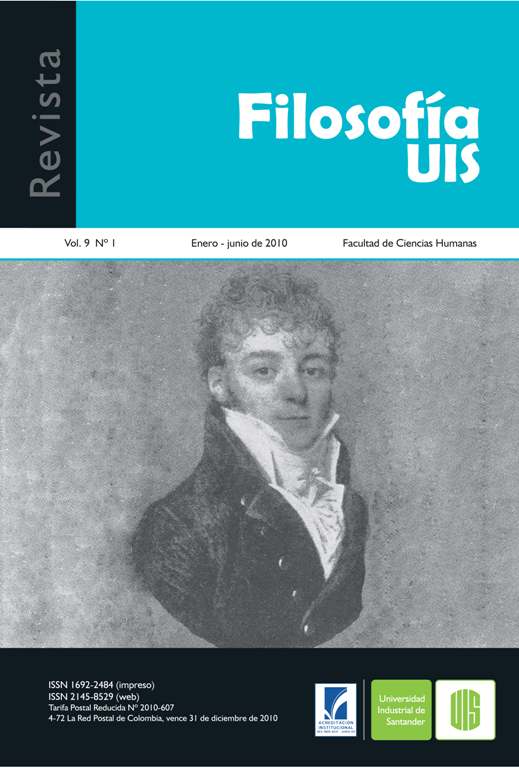Artigo de Pesquisa
Publicado 2010-07-27
Palavras-chave
- Husserl,
- conciencia,
- intuición,
- percepción,
- intencionalidad
Como Citar
Ferrarello, S. (2010). Intuición y percepción en la sexta Investigación Lógica de Edmund Husserl. Revista Filosofía UIS, 9(1), 117–129. Recuperado de https://revistas.uis.edu.co/index.php/revistafilosofiauis/article/view/1429
Copyright (c) 2010 Susi Ferrarello

Este trabalho está licenciado sob uma licença Creative Commons Attribution 4.0 International License.
Resumo
En este artículo nos concentraremos en la definición de la percepción y en su relación con la intuición. Nuestro artículo pretende investigar si existe una diferencia entre estos dos conceptos y cómo éstos trabajan. En este estudio, nos haremos uso sobre todo de Husserl, en particular de la sexta Investigación Logica. Aquí el filósofo distingue entre Anschauung (intuición) y Wahrnehmung (percepción) como dos (¿diferentes?) formas de ver y de tomar la realidad. Ambos conceptos apuntan al entendimiento de la realidad. Sin embargo, la intuición parece ser más importante que la percepción.
Downloads
Não há dados estatísticos.
Referências
- Bergson, Henri (1965). Matière et mémoire, Paris : Puf.
- Descartes, René (1927). The Passions of the Soul, New York: Charles Scribner’s Sons.
- Husserl, Edmund (2001). The Shorter Logical Investigation, London and New York: Routledge.
- James, William (1950). Principles of Mental Psychology, vol. 1., New York: Dover Publications.
- Lévinas, Emmanuel (2001). La teoria dell’intuizione nella fenomenologia di Husserl, Milano: Jacka Book.
- Locke, John (1924). An Essay Concerning Human Understanding, Oxford: Oxford University Press.
- Pradines, Maurice (1928). Le problème de la sensation, Paris : Les Belles Lettres.
- Russell, Bertrand (1927). Philosophy. New York: W. W. Norton.
- Churchland, Paul (1989). A Neurocomputational Perpsective: The Nature of Mind and the Structure of Science, Cambridge, Massachusetts: The MIT Press.
